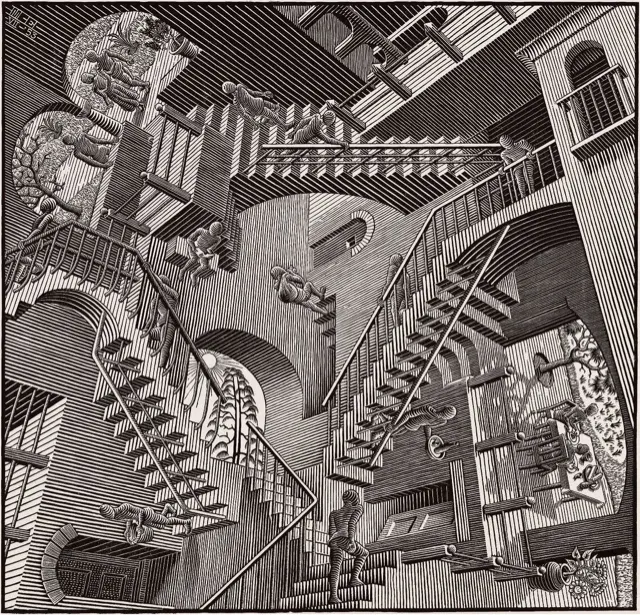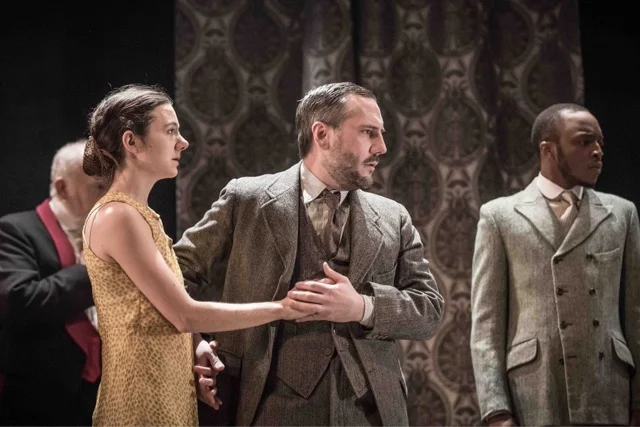Michael Pennington (King Lear) – photo courtesy of Royal & Derngate
I will have such revenges on you both
That all the world shall – I will do such things –
What they are yet I know not, but they shall be
The terrors of the earth! You think I’ll weep:
I have full cause of weeping, but this heart
Shall break into a hundred thousand flaws,
Or ere I’ll weep. O Fool, I shall go mad!
I believe that, last night, I witnessed the greatest Shakespearean performance of my long life… – and not just from the actor in the principal rôle (that was simply a major miracle…). We had arrived at the
Royal & Derngate, in Northampton,
knowing that Michael Pennington would be the supreme
King Lear. What I think we were surprised by was the corresponding calibre of the company that surrounded him – some of whom were only recent graduates. We shouldn’t have been, though; we really shouldn’t…
I was immediately knocked out by Michael’s sensitivity with Shakespeare’s language…. It was clear that he was able to create complex and vivid relationships onstage….
Michael was incredibly open and generous. He was the dream collaborator: hard-working, curious, unsentimental. He was interested in what everyone in the room had to say. And yet he also had instincts which were unwavering. He was immediately able to portray a powerful man losing his grip on power, on his mind, and on his sense of self.
I don’t want to go into too much detail: as this was only a preview. However, this was such an extraordinary ‘event’, that I still believe it needs commenting on for prosperity – an act which, as well, I hope, will help fill some of those astonishing empty seats that we also witnessed. (You would have thought, from the cheers and applause at the end that the Royal Theatre had been packed to its beautiful rafters. But everyone there knew that this – for me, Shakespeare’s greatest play – had received an insightful, emotionally-devastating, utterly perfect rendition – perhaps its greatest performance.)
Michael Pennington (King Lear), centre; with company – photo Marc Brenner/Royal & Derngate
I will come to the individual actors – all of whom were equally astounding: just in different ways… – in a moment: but the overall power of the performance came, I think, not only from Pennington’s renowned inclusivity, but the cohesiveness of the all-inclusive vision (partially, due, I think, to his recent experience of playing Lear in New York – see below – but also Max Webster’s intelligent direction). But as well as the usual sweeping story arcs and subplots, emphases and themes were more fully developed than I have seen before; and tiny moments given cunning significance.
There is one scene (Act 3, Scene 6) – “A chamber in a farmhouse adjoining the castle” – which will stay with me for a very, very long time (as will the whole night): where Kent, Gloucester, Edgar and the Fool – “Come on, my boy. How dost, my boy? Art cold?” – all seem to be talking at cross-purposes. Everyone is, essentially, mad; pretending to be mad; professing madness; scared of going mad; or attempting to see through Lear’s own madness (if it is such…). This was given full, chaotic, rein – and reminded me how ‘experimental’, when compared to the majority of his plays, Shakespeare really can be. Not only do we get characters driving on the story with expositional soliloquys; but there was an almost Beckett-like intensity, here. Is this the template for
Endgame – 350 years ahead of its time…?
Michael Pennington (King Lear) – photo Marc Brenner/Royal & Derngate
Not wishing to single out any individual other than Pennington – who did not act, as such: he simply was Lear, navigating his way through the intense ravages of senility – of perhaps even Alzheimer’s: with its moments of grief; anger; lucidity; regret; forgetfulness; of rage against his very condition; seeming “to age thirty years” – I shall address the company in alphabetical order. Simply put, each one brought something new, something strong, to their part: the sum of which was phenomenal (to say the least).
Michael Pennington (King Lear); Sally Scott (Regan); Shane Attwooll (Cornwall) – photo Marc Brenner/Royal & Derngate
Shane Attwooll was a Duke of Cornwall who grew from hen-pecked husband to vicious, erotically-charged interrogator: plucking out Gloucester’s eyes with relish and believable malice. “Lest it see more, prevent it. Out, vile jelly! Where is thy lustre now?” He seemed to visibly grow in stature and menace; and the fact we had no sympathy at his demise is a reflection of his innate power.
Catherine Bailey was simply the most vile Goneril – but with such great depth. (This is A Good Thing. I have often found the “unnatural hags” one-dimensional – both on the page and the stage.) She gave Lear as good as she got; and was a commanding presence in every scene she appeared in. Poor Albany – whatever did he do to deserve this?
Beth Cooke was not the weak Cordelia we sometimes see, either. A fighter from the off – and therefore the emotional core of the play – you truly felt she was in charge of her own destiny. She was both powerful and piteous (even pitiable); and her love for her father continually shone in those tear-stained eyes.
Pip Donaghy (Gloucester); Beth Cooke (Cordelia); Reginald Edwards (Burgundy); Caleb Frederick (France) – photo Marc Brenner/Royal & Derngate
Pip Donaghy was an authoritative Earl of Gloucester – less spineless than he is sometimes seen; but still overly trusting of his bastard son. In some way, he holds a mirror up to Lear… – yet, where Lear is always surrounded by those who love him (even if they are not sure why), Gloucester is alone. His extended moment, thus deserted, under “the shadow of this tree”, surrounded by war, was beautiful and soul-rending. Donaghy is an actor who can make a shopping-list seem profound. He has real gravitas – and seems unafraid to use it.
Reginald Edwards as the Duke of Burgundy and Curan (as well as many other parts: this is a small, and tightly-knit company) also brought impassioned significance to his few lines. I wish there had been more opportunity for him to demonstrate the poetry he is obviously so capable of.
Tom McGovern (Kent); Joshua Elliott (Fool); Michael Pennington (King Lear): in rehearsal – photo courtesy of Royal & Derngate
Joshua Elliott was simply astounding as the Fool. A beautiful falsetto singing voice, to go with his conscious
concertina; and a resounding, contrasting spoken baritone sonority. Here was a demonstrable maturity and wisdom far, far beyond his young years. Every single line and action was captivating; infused with his love of Lear – his willingness to risk a whipping for coming too close to the mark almost tangible. I so hate the fact that the Fool simply vanishes: but (even after seeing the great
Kathryn Hunter scurry through the equally great Greg Hicks’ long legs with utterly astounding aplomb) never more so than here. That he was the equal of Pennington speaks volumes….
Thou shouldst not have been old till thou hadst been wise.
Gavin Fowler (Edgar); Daniel O’Keefe (Oswald) – photo Marc Brenner/Royal & Derngate
Gavin Fowler as Edgar was also remarkable: demonstrating an intense, almost beauteous versatility. His feigned insanity was virtuosic; as was his protection of his father. His beautiful rendition of those heart-breaking, famous final lines was powerful, yet gentle – enough to guarantee a full ten seconds of silence before the eruption of approbation.
The weight of this sad time we must obey,
Speak what we feel, not what we ought to say:
The oldest hath borne most; we that are young
Shall never see so much, nor live so long.
Caleb Frederick as the King of France and the Doctor (as well as a wonderful trumpet-playing herald) – another recent drama graduate – was yet another great discovery. His acting was authoritative, sober and powerfully affecting; and central to the sensibility of the whole production.
Adrian Irvine (Albany); Catherine Bailey (Goneril) – photo Marc Brenner/Royal & Derngate
Adrian Irvine, as the Duke of Albany, flourished as the play progressed. In some ways, an unforgiving part – he begins as meek (if not entirely weak); but eventually proves his strength and honesty. Here was a keen and human portrayal, with real weight.
Another startling wise-beyond-his-years characterization was Scott Karim as Edmund (the illegitimate psychopath) – both in his ineffable coolness (both senses), as well as the bottomless darkness his presence always brought to the stage. Here was a master manipulator – of just about every other player… – and savager of souls. The very definition of a bastard – and magnificently so.
Scott Karim (Edmund); Catherine Bailey (Goneril) – photo Marc Brenner/Royal & Derngate
I really liked Tom McGovern as the affable, loyal Earl of Kent (with those glasses, I wondered if his first name was Clark?) – and madcap alter ego (Mc)Caius: although one of my companions was not utterly convinced. I believe he has little or no power to affect change: and is only motivated by his duty and bravery – and thusly the part was played. Here was a performance – for me – of great calmness and loyalty.
My life I never held but as a pawn
To wage against thine enemies, ne’er fear’d to lose it,
Thy safety being motive.
Daniel O’Keefe as Oswald played it as haughtily and reservedly as I think is possible – although his best moment was his astonishment at his mistress’ clumsy attempt to seduce him. You felt there was a heart in there, somewhere – just that he wasn’t quite sure how to use it. His loyalty was his downfall, and his dying regret all-too palpable.
Sally Scott was a charming, yet nasty piece of work, as Regan: a perfect companion to Goneril. One moment jealously protective of her newborn child; the next, kicking its basket with vehemence and just pure nastiness. Another powerful performance – again demonstrating that the two elder sisters are crucial characters… – eventually getting as bad as she gives; as she so rightfully deserves.
Michael Pennington (King Lear), right; with company – photo Marc Brenner/Royal & Derngate
The simple, yet evocative and dark, discomfiting design was by Adrian Linford; and I thought the period setting worked extremely well. The lighting – by Natasha Chivers – and sound by Matthew Bugg (along with composition and movement) – were truly integral to this: demonstrating the massive depth of talent in regional theatre. (Oh, that storm scene! I too shivered upon that heath; shrank from the theatre-shaking thunder and blinding lightning; leaning into the mighty force of nature, as it stung my eyes, my body, my soul. I almost cowered behind my seat, too, in fright and sorrow….)
Credit should also be paid to Christian Durham, associate director; Joyce Nettles, a casting director of great insight and courage (especially of her own convictions); and Julia Locascio, assistant director. A great many thanks also go to the Ambassador Theatre Group for making this miracle possible; and to Philip Franks for originating the production and assembling the creative team.
I shall, of course, be trying to get a ticket for its visit to Malvern, at the end of June!
Michael Pennington (King Lear); Beth Cooke (Cordelia) – photo Marc Brenner/Royal & Derngate
Once more, this week, I have been fortunate to witness something for which I have unfortunately run out of words in describing…. However, if you wish to read about Pennington’s perspicacity, his sensitivity, his discernment with regards to performing the works of
Sweet William – as well as his experiences of doing so – never mind his exceptional, exceptionally-modest talent… – then I would recommend you pore over his
own words – including the soon-to-be-published
King Lear in Brooklyn. These state clearly what I am struggling to articulate….
All I can say, as I did at the very beginning of this report, was that this was a landmark portrayal; an actor at the very pinnacle of his (and everyone-else’s) very great game. That his genius encompassed all those around him; that his howls as he dragged Cordelia’s slumped body onto the stage haunted my dreams (and will for many a night); that his eyes twinkled, then dimmed, and twinkled once more, before finally fading to naught; that he made us not only see – but feel, taste – that mouse and toasted cheese, those parted curtains; that the roof of the Royal, for one moment, floated heavenwards as we called him back to the stage; that he was, for three hours, Lear – not an actor in increasingly-threadbare clothing – …all these things are sadly not enough to even begin to describe what we saw; experienced; heard; were immersed in….
O, let me not be mad, not mad, sweet heaven!
Keep me in temper, I would not be mad!


































